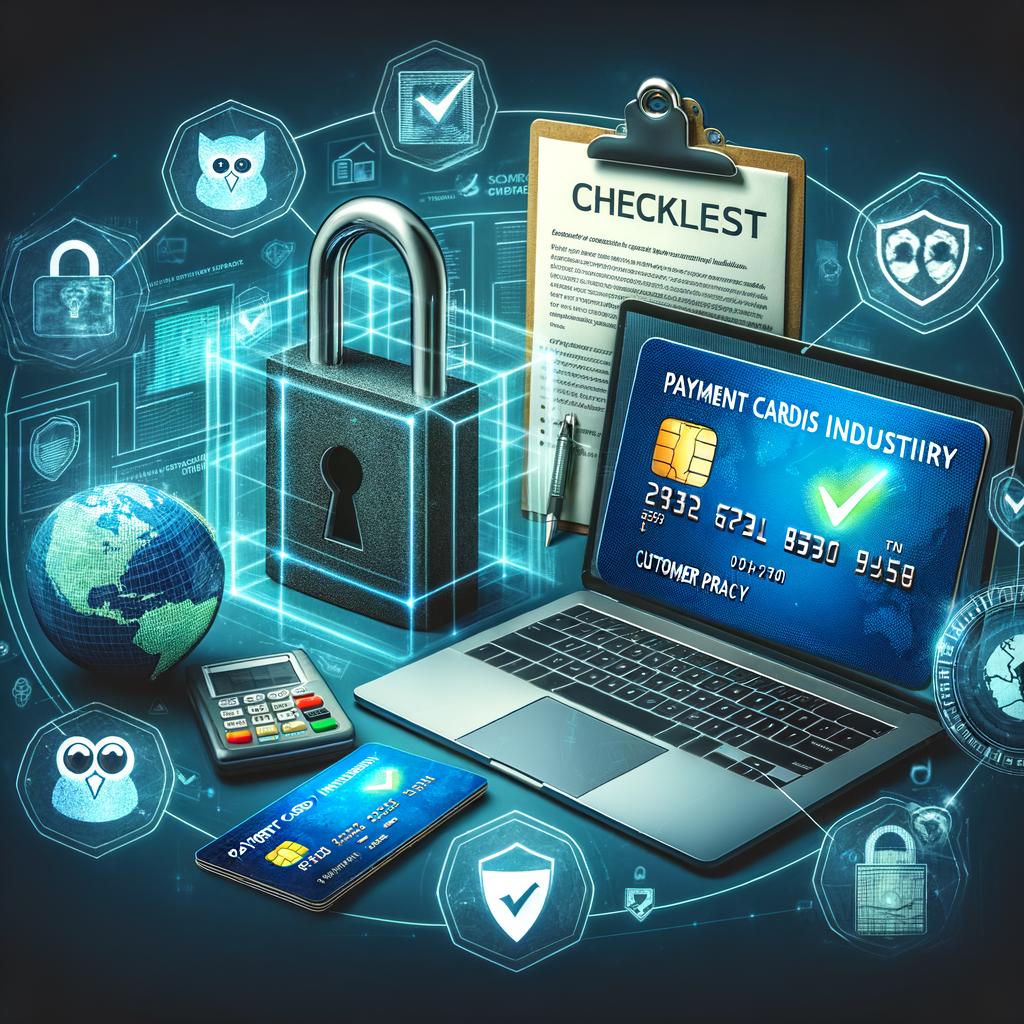Best Practices for Maintaining PCI Compliance in E-commerce
Hey there, ecommerce enthusiasts! If you’re in the e-commerce game, then you know that keeping up with ever-changing regulations and standards can feel like a wild ride. One of the most important aspects of online business is maintaining PCI compliance. That’s right, we’re diving into the world of payment card industry compliance – but don’t worry, we’ll make it fun (or at least as fun as PCI can get) and give you all the best practices so you can tackle this beast like a pro. So buckle up and get ready to navigate the world of ecommerce with finesse, because we’ve got your back when it comes to keeping your online business secure and compliant!
Securing Your Customers’ Payment Information: Essential PCI Compliance Practices for E-commerce
Nowadays, with the rise of online shopping, ensuring the security of your customers’ payment information has become more crucial than ever. Implementing the essential PCI compliance practices is essential to protect both your customers and your business. Here are some best practices to maintain PCI compliance in e-commerce:
-
Encrypt data transmission: Use secure sockets layer (SSL) encryption to secure the communication between your website and customers’ browsers. This ensures that any payment information entered on your site is encrypted and cannot be intercepted by unauthorized individuals.
-
Regularly update software: Keep all your e-commerce software, including your content management system (CMS) and plugins, up to date. Regularly check for updates and security patches to prevent vulnerabilities that hackers could exploit. Utilize security plugins that can scan your website for any potential security risks and vulnerabilities.
Understanding the Payment Card Industry Data Security Standard (PCI DSS) and Its Importance in E-commerce
With the increasing prevalence of online shopping, it has become essential for e-commerce businesses to prioritize the security of customer data. One of the most important standards that these businesses need to adhere to is the Payment Card Industry Data Security Standard (PCI DSS). By complying with PCI DSS, e-commerce businesses can ensure that they have robust security measures in place to protect payment card information, thereby fostering trust and confidence among customers.
There are several best practices that can help businesses maintain PCI compliance in the e-commerce realm. First and foremost, it is crucial to regularly update and patch all software and systems that handle payment card data. This helps to address any vulnerabilities that may be exploited by hackers. Additionally, businesses should frequently monitor their networks and systems for any unauthorized access or suspicious activity. Implementing robust access controls, including strong password policies and two-factor authentication, can significantly enhance the security of customer data. It is also important to educate employees about the significance of PCI compliance and provide ongoing training to keep them aware of the latest security threats and best practices. By following these best practices and staying up to date with evolving PCI standards, e-commerce businesses can safeguard customer data and maintain a secure online shopping environment.
| Best Practices for Maintaining PCI Compliance in E-commerce |
|---|
| Regularly update software and systems: Keep all payment card handling software and systems up to date by applying patches and updates promptly. |
| Monitor networks and systems: Maintain regular monitoring of networks and systems to detect any unauthorized access or suspicious activity. |
| Implement access controls: Use strong password policies and two-factor authentication to control access to sensitive payment card data. |
| Educate employees: Train employees about the importance of PCI compliance and provide ongoing education to keep them updated on the latest security threats and best practices. |
Building a Strong IT Infrastructure: Proven Strategies to Ensure PCI Compliance in Online Retail
In order to maintain PCI compliance in the world of e-commerce, it is crucial for online retailers to build a strong IT infrastructure. By implementing proven strategies, retailers can ensure that they are meeting the necessary security standards and protecting sensitive customer data. Here are some best practices to consider:
- Implementing secure authentication measures: One way to ensure PCI compliance is by implementing secure authentication measures, such as two-factor authentication or biometric authentication. These additional security layers will help prevent unauthorized access to sensitive customer information.
- Regularly updating software and systems: It is essential to keep all software and systems up to date in order to maintain PCI compliance. Regularly applying security patches and updates will minimize the risk of vulnerabilities that could be exploited by hackers.
- Encrypting sensitive customer data: Encryption provides an added layer of protection for sensitive customer data. By encrypting data both at rest and in transit, online retailers can ensure that it remains secure and unreadable to unauthorized individuals.
In addition, online retailers should also consider implementing a robust network firewall and regularly monitoring network activity. By monitoring for any suspicious activity, retailers can quickly detect and respond to potential threats. It is also important to conduct regular security audits and vulnerability assessments to identify any potential weaknesses in the IT infrastructure.
Compliance Beyond Technical Measures: Prioritizing Employee Training and Awareness
In the world of e-commerce, maintaining PCI compliance is crucial for the security and success of your online business. While technical measures are important, it is equally essential to prioritize employee training and awareness when it comes to compliance. By ensuring that your staff is well-informed and educated on PCI requirements, you can greatly reduce the risk of data breaches and protect both your customers and your business.
One best practice for prioritizing employee training is to establish a comprehensive training program that covers all aspects of PCI compliance. This program should include regular sessions on topics such as data security, handling of sensitive customer information, and best practices for securely processing payments. Engaging and interactive training sessions can be conducted, incorporating real-life scenarios and examples to ensure that employees fully grasp the importance of compliance.
Another effective way to prioritize employee awareness is through ongoing communication and reinforcement. Regularly reminding staff about the potential risks of non-compliance and the importance of following PCI guidelines can help keep compliance top of mind. This can be accomplished through email newsletters, internal memos, or even posters in common areas. Highlighting success stories and positive outcomes resulting from compliance efforts can also serve as motivation for employees to remain vigilant in their adherence to PCI requirements.
Not only is employee training and awareness a crucial aspect of maintaining PCI compliance, but it also fosters a culture of security and responsibility within your organization. By investing in your staff’s knowledge and understanding of PCI requirements, you are not only meeting compliance standards, but also building a strong foundation for the long-term success and reputation of your e-commerce business. Remember, compliance is not just about ticking boxes – it’s about safeguarding your customers’ trust and protecting your business from potential cyber threats.
Insights and Conclusions
And that’s a wrap, folks! We hope you’ve enjoyed this wild ride through the world of PCI compliance in e-commerce. We’ve covered everything from the secrets of secure payment processing to the art of safeguarding your precious customer data.
Remember, maintaining PCI compliance isn’t just essential for your business’s reputation, it’s like strapping on a superhero cape to protect your customers from the evil clutches of cyber fraudsters. So, follow these best practices and be the hero your online shoppers deserve!
Keep those firewalls fortified, those passwords strong, and stay up-to-date with the latest security patches. And, hey, if you’re feeling extra adventurous, might as well throw in some multi-factor authentication for good measure. No lousy hackers will stand a chance against your impenetrable fortress!
Don’t forget to perform those regular vulnerability scans and penetration tests, like a DJ spinning the freshest beats to keep your systems on their toes. And when it comes to choosing your trusted partners, remember: they should be as committed to security as you are to pranking your co-worker with whoopee cushions.
But hey, let’s not get all serious and laptop-locked. Embrace the playful side of e-commerce! Treat your compliance journey like a rollercoaster ride, and always keep an eye out for exhilarating new technologies that can boost both your security and your profit margins.
So go forth, e-commerce warriors, armed with these best practices, and fearlessly conquer the vast digital realm. May your transactions be secure, your customers be happy, and your business thrive in this wild, wild West of online shopping!
And with that, it’s time for us to sign off and let you continue your quest for PCI compliance greatness. But remember, should you ever find yourself lost in the treacherous depths of cyberspace, just follow the trail of rainbow-colored pixels and you’ll find your way back to us sooner or later.
Stay secure, stay compliant, and stay groovy, e-commerce trailblazers. Until next time!






